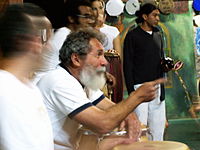- Bira Almeida
-
Ubirajara (Bira) Guimarães Almeida (born 1943), better known as Mestre Acordeon is a native of Salvador, Bahia, Brazil, and a master of the Brazilian folk art known as Capoeira. His international reputation as a respected teacher, performer, musician, organizer, and author is built upon fifty years of active practice, as well as research into the origins, traditions, political connotations, and contemporary trends of Capoeira. Mestre Acordeon has travelled extensively promoting Capoeira outside Brazil.[1][2]
Acordeon was a student of the legendary Mestre Bimba in the late 1950s and began teaching Capoeira in the early 1960s. He founded the Grupo Folclorico da Bahia in 1966 that performed the show Vem Camará: Histórias de Capoeira in the Teatro Jovem in Rio de Janeiro. The show presented an approach to Capoeira that influenced a new generation of young capoeiristas and affirmed the concept of grupo de Capoeira and today’s capoeira regional. He won three titles in capoeira national championships in the 1970s before coming to the United States towards the end of 1978.[citation needed] Acordeon introduced Capoeira on the West Coast in early 1979 and currently he maintains the United Capoeira Association (UCA) with several associated schools. He also has created the Capoeira Arts Foundation in Berkeley, California which sponsors UCA and the Projeto Kirimurê, a social program for children in the neighborhood of Itapoã in Salvador, Bahia, Brazil.
Acordeon has recorded 9 CDs, produced 3 DVDs, and is the author of magazine articles and books about Capoeira, including Agua de Beber, Camará: A bate Papo de Capoeira,[3] and the Capoeira Arts Café: An Academia de Capoeira.[4] His book Capoeira: A Brazilian Art Form,[1] was the first Capoeira book in English. He has received honors in support of his practice, teaching, and research of Capoeira. Among them, in the Fall of 1994, he became the first "artist" to receive the Tinker Visiting Professorship at the University of Wisconsin–Madison.[5] In 2008, in recognition of his thirty years of continuous work in the West Coast, the City of Berkeley proclaimed October 18 as Mestre Acordeon Day.[6]
Mestre Acordeon spends much of his time travelling the world teaching Capoeira. From February 17th to February 20th he was in Mexico City courtesy of the Capoeira group Longe do Mar, inaugurating the new studio. He travelled to the UK on the 11th to the 13th of March 2011 to teach at the Cordão de Ouro Spring Meeting in Liverpool, which was run by Contra Mestre Parente of Cordão de Ouro North West UK. He then delivered masterclass workshops at Cordão de Ouro Birmingham's 2nd International Capoeira Festival and Batizado from 18th to 20th March 2011.
References
- ^ a b Almeida, Bira Capoeira: A Brazilian Art Form, 2nd Ed. North Atlantic Books, 1993.
- ^ Lewis, John Lowell. Ring of Liberation: Deceptive discourse in Brazilian Capoeira, The University of Chicago Press. Chicago, IL. 1992
- ^ Almeida, Bira. Agua de Beber, Camará: A bate Papo de Capoeira. Vanity press. 1999. (Portuguese)
- ^ Capoeira Arts Café: An Academia de Capoeira. Almeida, Bira. Vanity press. 2008.
- ^ Blocker, Susan. "Dancers learn 'dialogue' from a master." Wisconsin State Journal. October 7, 1994.
- ^ Miao, Daisy. "Berkeley festival to celebrate Capoeira master". Oakland Tribune. Oct 12, 2008
Basic topics Capoeira Angola · Music · Techniques · In popular culture · Toques · Malicia · Batizado · PractitionersMestres Acordeon · Amen Santo · Barba Branca · Manuel dos Reis Machado · Cinézio Feliciano Peçanha · Jelon Vieira · João Pereira dos Santos · Jogo de Dentro ·
João Grande · Mestre Barrão · Pedro Moraes Trindade · Nestor Capoeira · Vicente Ferreira Pastinha · Pé de Chumbo · Rildo Cordeiro · Reinaldo Ramos Suassuna · Mestre Camisa · Mestre Virgilio, Mestre Roxinho ·Groups and foundations Axé Capoeira · Grupo Capoeira Brasil · International Capoeira Angola Foundation · ABADÁ-Capoeira · Grupo CandeiasSee also Categories:- 1943 births
- Living people
- Brazilian musicians
- Capoeira mestres
- People from Salvador, Bahia
Wikimedia Foundation. 2010.

